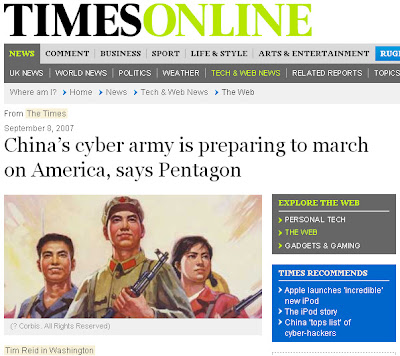Howard French’s recent article China’s Economic Revival Minted in Counterfeit asks “What is there to say about a country where something masquerading as the newest Harry Potter book comes out on the market 10 days before the genuine item?” Apparently, what to say is that because Deng Xiaoping announced everyone ought to become rich, no one in China cares about copyright or intellectual property rights. French then goes on:
I have searched in vain for signs of a serious, sustained discussion of counterfeiting and intellectual property violations in the Chinese press. Yes, there are occasional statements to the effect that intellectual property must be respected, but few have bothered to take a close look at the problem, to acknowledge its extent in China or vigorously debate its consequences.
That must have been a very short search, because I plugged words like “cultural industry”, “musicians”, “piracy” and “income” into Baidu and came up with some serious, sustained discussion, such as this long article on the difficulty of protecting royalties from karaoke, Rock God Cui Jian touching on the issue in a 10 year retrospective on Chinese musicians, excerpts from the meeting WIPO and the State Copyright Bureau, and dozens of others. And that was just in Baidu’s news search. There’s more out there, and some touches on the part of China’s weak IP protection that Howard French and many other Western commentators neglect – namely, that piracy wreaks far more damage on China’s domestic film, music and print industries than it does on other nations. Consider that the piracy rate in China is 90%, compared to 27% in the U.S., or that the cultural industries of the U.S., Singapore and Canada are 18-25%, 24.4% and 40% of GDP respectively. China’s? 3.1%. The title to French’s article suggests that counterfeiting has somehow fueled China’s growth. It seems far-fetched, considering piracy and government restrictions have conspired together to reduce China’s cultural industries to the equivalent of a school bake sale.
Part of the problem with piracy is certainly greed and corruption. As Cui Jian notes:
在某些官员的眼里,艺术家对社会的贡献,是远远低于商人,甚至非法商人的贡献。In the eyes of some officials, artists contribution to the community is far below that of businessmen and even illegal contributions.
他们宁愿忽略艺术,而纵容一些经济上的腐败现象,也不愿意在艺术领域里投入更多的关注,甚至有很多政府文化部门之所以存在,其最根本的意义就是限制艺术家的创作,限制所有具有争议性的艺术形式的出现。 They prefer to ignore the arts, and some participate in economic corruption, also none are willing to invest more attention in artistic fields, and even though many government cultural departments exist to foster the arts, in reality their sole purpose is to stifle artistic creation and the appearance of any controversial art.*
Yesterday I went by my local pirated DVD shop. They’ve been closed the last three days, and I asked why. Of course the answer was “the police were coming”. How did they know? “Everybody knows.” Why don’t the police come another time? “Because they’re paid off”. It’s funny, too, because Howard French gets it mostly right on this part when he says:
At the same time, as with product safety problems or intellectual property issues, the government is much like the greyhound on a racetrack chasing the mechanical rabbit. Reality exceeds its grasp, and there is no hope of catching up.
That much is certainly true. If local pirates pay off cops to file a false report, and everybody freakin’ knows (let’s all note that its consider so accepted that telling the foreigner is no big deal), and this happens all over the country – precisely what is the central government suppose to do about it? Start a massive political campaign? Death sentences? The issue is local, as are many others in China, and hanging it on the central government – encouraging the sort of paternalistic authoritarianism that is usually reprimanded – seems a rather stupid idea. Instead, perhaps finding open dialogue and reporting on where it is happening, and commenting on how to strengthen awareness and discussion, would be a better focus. Instead, at the end of French’s piece it is revealed that he’s using his IHT soapbox to bicker with a letter writer who says Westerners should quit bitching and moaning. Suddenly French’s opening about “What is there to say about a country…” not only looks like windbaggery, but it starts to look petty and snide. Is this letter really worth this attention? French translates this one, single letter into “a giant collective shrug in a body of opinion for which the world is effectively divided, consciously or not, into us and them, automatically inoculating the believers against anything perceived as outside criticism.”
Wait a minute: who just took the opinion of one letter, and applied it to a big ol’ mess of people? And when you have the answer to that, tell me just who is the one carving the world into “us” and “them”. One thing I’ve learned by blogging about China is that when a nationalist crank starts trying to push your buttons, you have to remember not to identify them as speaking for China. Because then they’ve got you right where they want you – helping them make it “us” versus “them”. Oh, Howie, you just failed China Blogging 101!
Trent Reznor, of Nine Inch Nails, however, seems to have a better handle on counterfeiting in China. He’s got a whole Chinese language section on his website, where he states:
“As for the special situation in China, it does not seem to be easy to obtain Western music via legal channels, so I have the following suggestion for our fans: If you can find and buy our legal CDs, I express my thanks for your support. If you cannot find it, I think that downloading from the Internet is a more acceptable option than buying pirated CDs. Our music is easy to find on the Internet, and you might not need to spend much effort to find most of our songs. If you like our songs after you’ve heard them, please feel free to share it with your friends. As I have put all my effort and heart into my music, I sincerely hope that more and more people can share the enjoyment with us.”
Instead of lecturing Chinese people on how bad they are, Reznor has elected to engage in dialogue. Chinese people are attracted to counterfeit goods for the same reason Americans are attracted to Chinese (and sometimes counterfeit) goods: they’re cheaper. He’s no fan himself of major record labels and their inflated CD prices. After their last contract album with Universal, NIN going to sell everything online, for “say, $4 an album”.
Reznor was last seen at the Beijing Pop Festival. Cui Jian was there too. I wasn’t. Dammit.
*Thanks to Feng37 for better clean-up of Google translation.














